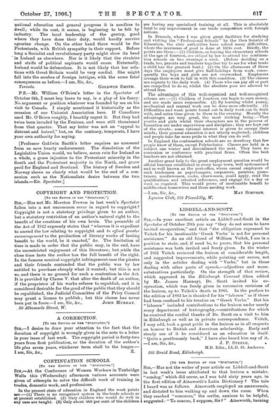COPYRIGHT AND PROTECTION.
[To THE EDITOR OF THE "SPECTATOR."] SIR,—Has not Mr. Moreton Frewen in last week's Spectator fallen into a not uncommon error in regard to copyright ? Copyright is not a statutory privilege given to an author, but a statutory restriction of an author's natural right to the benefit of the creations of his own brain. The preamble of the Act of 1842 expressly states that "whereas it is expedient to amend the law relating to copyright and to afford greater encouragement to the production of literary works of lasting benefit to the world, be it enacted," &c. The limitation of time is made in order that the public may, in the end, have the unrestricted enjoyment of this literature; but while the close time lasts the author has the full benefit of the right. In the famous musical copyright infringement case the pirates and their friends contended that the public was by law entitled to purchase cheaply what it wanted; but this is not so, and there is no ground for such a contention in the Act. It is provided by Clause V. that after the death of an author, if the proprietor of his works refuses to republish, and it is considered desirable for the good of the public that they should be republished, the Judicial Committee of the Privy Council may grant a license to publish ; but this clause has never been put in force.—I am, Sir, &c., JOHN MURRAY. 50 Albemarle Street, W.














































 Previous page
Previous page